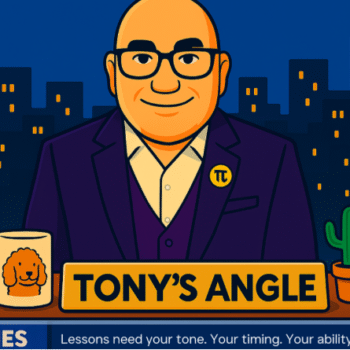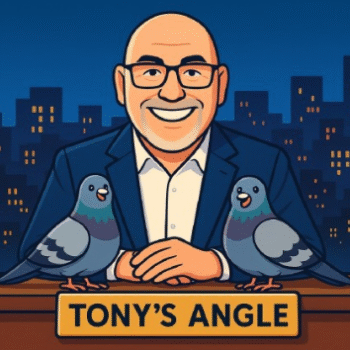It’s my birthday today (written on 30th June if you want to save the date for next year). No balloons. No surprise party (that I am aware of anyway). Just a quiet moment with a coffee and a cake.
I trained to be a teacher in the late 90s.
What you might know is that wasn’t quite the original plan.
Believe it or not, I actually wanted to be an air traffic controller. It wasn’t just a fleeting idea – I’d had my heart set on it for years. There was even a spell when I fancied being a Customs and Excise Officer too (blame the old TV series The Knock for that one!).
I went through all the assessments and made it right to the final stages. I was certain that was going to be my life. Then the letter arrived (in the days we got paper letters).
“Unfortunately, you’ve been unsuccessful… please reapply next year.”
Absolutely gutted.
Bursaries, Bursaries, Bursaries
The very next day, I walked into uni and spotted a poster advertising bursaries to train as a maths teacher. I had never seen them before, but for some reason today they stood out. One of those tiny, seemingly throwaway moments that – if you believe in fate (and I now do) – changes the direction of everything. I didn’t know it then, but that rejection was probably the best “no” I’ve ever received.
I signed up to train as a secondary maths teacher. It was one of a handful of courses where you also needed a second subject. Now, I was hardly an outdoorsy type. Camping? Not for me. Climbing? Terrifying. So naturally, I chose outdoor education. Why? To this day I’m not sure. Possibly because someone mentioned a shortcut – you could tick the box if you completed a football refereeing course.
So, one cold weeknight, I turned up to Weetwood Hall in Leeds for the first of what would be 10 or 12 sessions. A refereeing course. One evening a week. A couple of dozen people (all male) in a room. Sky Sports highlights on a portable TV. A copy of the rulebook, just in case anyone tried to fake it.
In that room, everyone else seemed to know football inside out. They played, coached, watched, lived it. They debated offsides with the energy of people solving world problems. I, on the other hand, sat quietly in the corner, trying to work out which direction the whistle should point. I nodded a lot. Repeated phrases I half-understood. “Run the Z” I would say!. Tried to blend in. I didn’t have a clue then. I still don’t.
But I’ll never forget how it felt to be in that room. The trainers were enthusiastic. The people were friendly. But I was out of my depth. I didn’t know the language, the in-jokes, the subtext. I didn’t feel confident to ask questions. That quiet voice in my head said: “Just keep your head down and don’t get picked on.”
A Sense of Belonging
It was the first time I’d properly understood what it feels like to be the one who doesn’t “get it.” Not because I wasn’t smart or couldn’t do it – but because I lacked the background knowledge. I didn’t feel like I was part of the club.
That feeling has stayed with me. It is something that I reflect on regularly. It’s probably one of the most important things that’s shaped the kind of teacher and leader I’ve tried to be.
Because in every classroom, there are children sitting there just like that. Quiet. Hoping not to be noticed. Just trying to get through the lesson without being exposed. They might be brand new to the country. They might be neurodiverse. They might have so much potential but have missed key building blocks. Or they might just feel like maths isn’t for them.
The training course wasn’t the problem. The people weren’t unkind. But the experience taught me something powerful about belonging. It’s not always about what’s taught. Sometimes, it’s about how it feels to be in the room.
So now, every time I think about inclusion, about teaching, about how we help children succeed – I think of that room at Weetwood Hall. I remind myself: it’s not enough to invite children into learning. We have to welcome them in. Make them feel safe. Equip them to thrive. Never let them feel like the quiet outsider who just hopes they won’t be asked to explain the offside rule.
Whether it’s 1999 or 2025, great teaching still starts with empathy, clarity and creating the kind of room where everyone believes they belong.
Now if you’ll excuse me, I’m off to eat some birthday cake and pretend – just for today – that I do understand football.
And that’s what Tony reckons.
Until next time.


